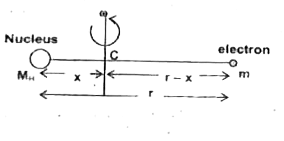Assertion : Angular momentum of a planet is constant about any point
Reason : For acting on the planet is a central force.
If both Assertin and Reason are correct and Reason is the correct explanation of Assertion
If both Assertion and Reason are correct but Reason is not the correct explanation of Assertion
If Assertion is true but Reason is false
If Assertion is false but Reason is true
The correct Answer is:D
To solve the assertion and reason question, we need to analyze both the assertion and the reason provided.
1. Understanding the Assertion:
- The assertion states that "the angular momentum of a planet is constant about any point."
- Angular momentum (L) is defined as L=r×p, where r is the position vector from the point about which we are calculating angular momentum, and p is the linear momentum of the planet.
2. Analyzing Angular Momentum:
- For a planet moving in an orbit (like Earth around the Sun), the angular momentum can be affected by external forces.
- The gravitational force acting on the planet is a central force, which means it acts along the line connecting the center of mass of the planet and the Sun.
3. Effect of Central Force:
- A central force does not exert a torque about the center of mass of the planet. However, if we consider angular momentum about any point other than the center of mass, the gravitational force can create a torque.
- Therefore, while the angular momentum about the center of mass remains constant (due to no net external torque), the angular momentum about any arbitrary point may change due to the torque created by the gravitational force.
4. Conclusion on Assertion:
- Since the assertion claims that angular momentum is constant about any point, this is incorrect. Angular momentum is only constant about the center of mass when no external torques act on it.
5. Understanding the Reason:
- The reason states that "the force acting on the planet is a central force."
- This statement is true because the gravitational force between the planet and the Sun is indeed a central force.
6. Final Evaluation:
- Since the assertion is false and the reason is true, the correct conclusion is that the assertion is incorrect while the reason is correct.
Final Answer:
- The assertion is false, and the reason is true.
- The assertion states that "the angular momentum of a planet is constant about any point."
- Angular momentum (L) is defined as L=r×p, where r is the position vector from the point about which we are calculating angular momentum, and p is the linear momentum of the planet.
- For a planet moving in an orbit (like Earth around the Sun), the angular momentum can be affected by external forces.
- The gravitational force acting on the planet is a central force, which means it acts along the line connecting the center of mass of the planet and the Sun.
- A central force does not exert a torque about the center of mass of the planet. However, if we consider angular momentum about any point other than the center of mass, the gravitational force can create a torque.
- Therefore, while the angular momentum about the center of mass remains constant (due to no net external torque), the angular momentum about any arbitrary point may change due to the torque created by the gravitational force.
- Since the assertion claims that angular momentum is constant about any point, this is incorrect. Angular momentum is only constant about the center of mass when no external torques act on it.
- The reason states that "the force acting on the planet is a central force."
- This statement is true because the gravitational force between the planet and the Sun is indeed a central force.
- Since the assertion is false and the reason is true, the correct conclusion is that the assertion is incorrect while the reason is correct.
- The assertion is false, and the reason is true.
Topper's Solved these Questions
- GRAVITATIONBOOK - DC PANDEY ENGLISHCHAPTER - GRAVITATIONEXERCISE - (C) Chapter Exercises
45 Videos
- GRAVITATIONBOOK - DC PANDEY ENGLISHCHAPTER - GRAVITATIONEXERCISE - (A) Chapter Exercises
68 Videos
- GENERAL PHYSICSBOOK - DC PANDEY ENGLISHCHAPTER - GENERAL PHYSICSEXERCISE - INTEGER_TYPE
2 Videos
- KINEMATICSBOOK - DC PANDEY ENGLISHCHAPTER - KINEMATICSEXERCISE - INTEGER_TYPE
10 Videos
Similar Questions
Knowledge Check
Total angular momentum of a rotating body remains constant, if the net torque acting on the body is
AzeroBmaximumCminimumDunity
Assertion: Linear momentum of a planet does not remain conserved.
Reason: Gravitational force acts on it.
View SolutionA : If angular momentum of an object is constant about a point then net torque on it about that point is zero.
R : Torque is equal to the rate of change of angular momentum.
View Solution
The angular momentum of the atom will be constant about an axis passing through
View SolutionA : Angular momentum of a satellite about a planet is constant .
R :Gravitational force is a central force so its torque about the sun is zero .
View SolutionAssertion: If linear momentum of a particle is constant, then its angular momentum about any point will also remain constant.
Reason: Linear momentum remains constant if Fnet=0 and angular momentum remains constant if τnet=0
View SolutionAssertion: For the plantes orbiting around the sun, angular speed, linear speed, K.E. changes with time, but angular momentum remains constant.
Reason: No torque is acting on the rotating planet. So its angular momentum is constant.
View SolutionAssertion The angular momentum of system always remain constant.
Reason For a system, τext=dLdt=0
View Solution
